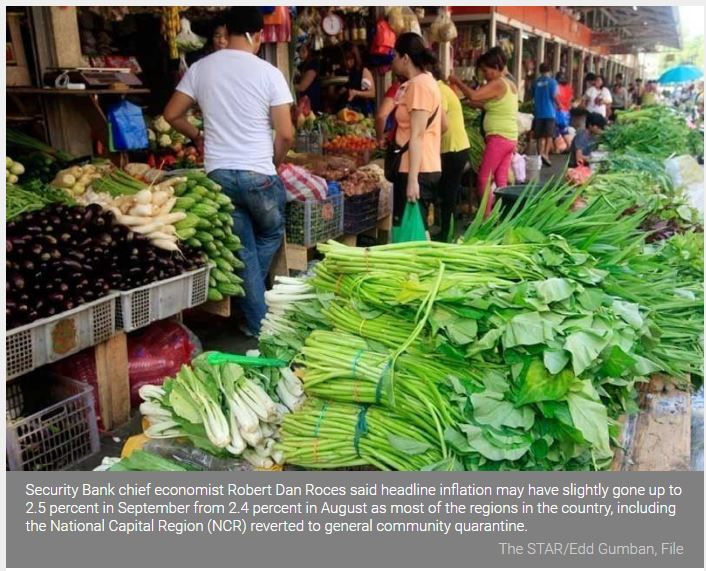Philippines: Inflation likely rose in September
MANILA, Philippines — Inflation likely picked up slightly in September as the economy continued to reopen gradually after imposing one of the longest and strictest lockdowns in the world, according to private economists.
Security Bank chief economist Robert Dan Roces said headline inflation may have slightly gone up to 2.5 percent in September from 2.4 percent in August as most of the regions in the country, including the National Capital Region (NCR) reverted to general community quarantine.
Security Bank sees inflation ranging from 2.3 to 2.7 percent for September.
“Mobility has increased, and this may have put upward pressure on transport costs once more. On the other hand, the price movements of major items in the food basket remain varied. The cost of rice and vegetables continue to go down, while price movements in fish and pork edged up slightly,” Roces said.
Roces also said inflation would remain benign in the fourth quarter and may average 2.5 percent this year or below the two to four percent target set by the Bangko Sentral ng Pilipinas (BSP).
“Upside risks include higher global oil prices, and some rebound in consumption following more relaxed quarantine measures, while downside risks include high unemployment and slower overall demand,” Roces said.
The economy stalled as the country slipped into recession with the gross domestic product (GDP) shrinking by a record 16.5 percent in the second quarter from 0.7 percent in the first quarter as the entire Luzon was placed under enhanced community quarantine in the middle of March to curb the spread of COVID-19.
The economy reopened as NCR shifted to general community quarantine in June, but Metro Manila and nearby provinces shifted to stricter modified enhanced community quarantine from Aug. 4 to 18 as cases doubled to more than 200,000 from 100,000.
Michael Ricafort, chief economist at Rizal Commercial Banking Corp. (RCBC), said the shift to general community quarantine for Metro Manila and nearby areas last month led to increased economic activity.
Ricafort said inflation for September likely picked up slightly to 2.5 percent as the further reopening of the economy fundamentally lead to higher demand and the corresponding pick up in the prices of many goods and services.
“As the government allowed further re-opening of more industries such as tourism and easing of restrictions on public transportation, prices would correspondingly pick up as well alongside with demand, from unusually low levels when quarantine standards were much tighter,” Ricafort said.
An offsetting factor that would help mitigate inflation, Ricafort said, is the 10 percent reduction in global oil prices, leading to a rollback in local fuel pump prices and helping lower transport costs.
Ricafort said the government allowed more jeepney and bus routes to re-open, helping ease transportation costs as the economy re-opens further, but capacity on mass transportation systems remains limited.
As the economy moves closer to the Christmas season, Ricafort said demand and prices of food as well as other goods and services, especially key Christmas spending items, could seasonally pick up.
For his part, Union Bank chief economist Ruben Carlo Asuncion said inflation last month eased to 2.3 percent from 2.4 percent in August due to lower rice and fuel prices.
“Lower prices of basic commodities, particularly rice and other essential goods, and fuel prices may have contributed largely to the annual decline in price levels,” Asuncion said.
Asuncion said demand for non-essential goods has remained muted due mainly to the impact of the COVID-19 pandemic on consumer spending.
“This may continue to contribute, although a small portion of measured inflation in general, to softer price levels from the short to medium term,” Asuncion said.
Inflation averaged 2.5 percent in the first eight months after easing to a three-month low of 2.4 percent in August from 2.7 percent in July.
The BSP expects inflation to settle between 1.8 and 2.6 percent in September.
Source: https://www.philstar.com/business/2020/10/05/2047165/inflation-likely-rose-september


 Thailand
Thailand




